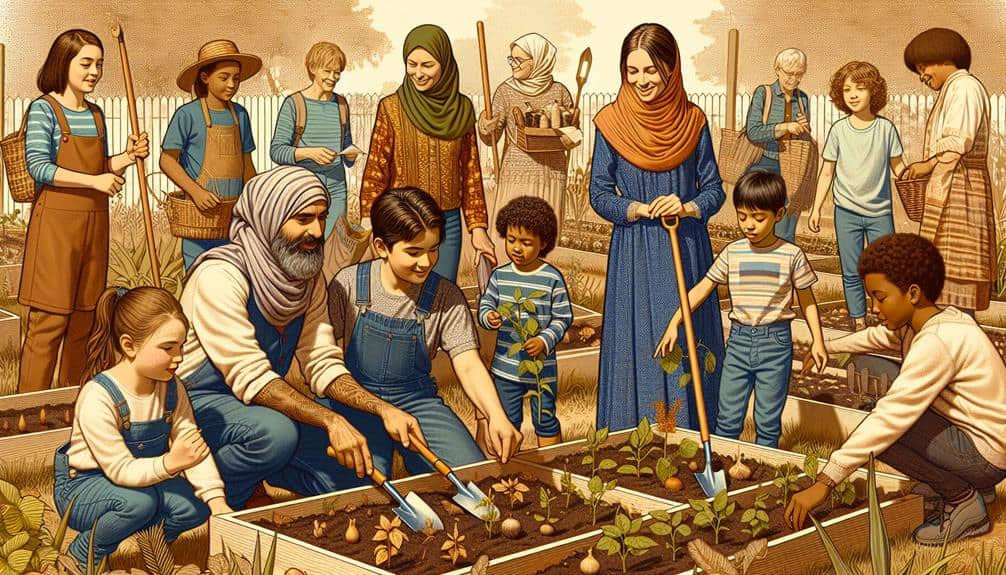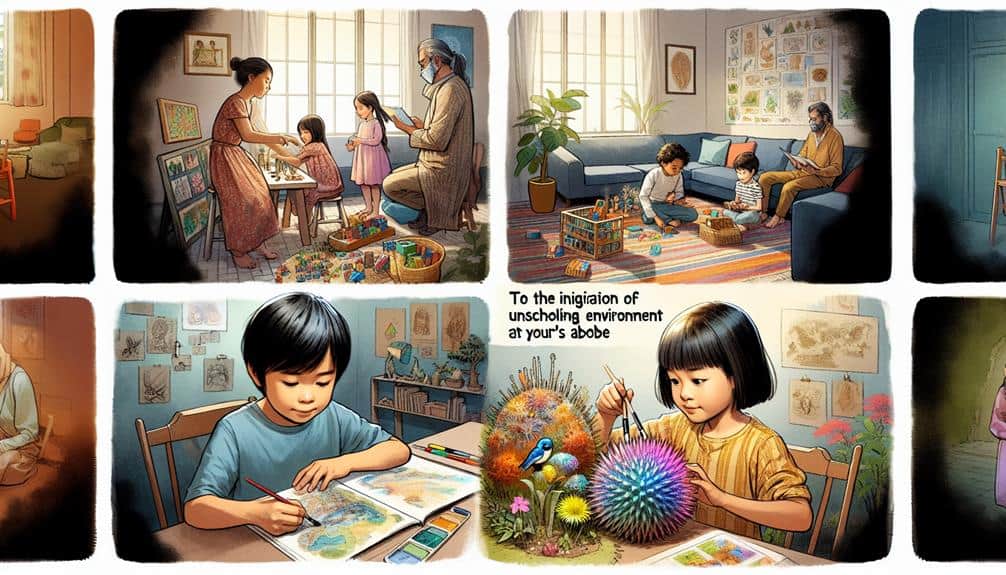In unschooling, community involvement is essential. It lets you hone social skills, gain diverse perspectives, and forge valuable support networks, enriching your learning journey and bracing you for future success. By engaging with a variety of people, you enhance communication abilities and embrace critical thinking through cultural exchanges. Connecting with other unschooling families fosters lasting relationships and provides access to essential resources. Real-world experiences and community interactions lay a strong foundation for practical skills and emotional well-being in unschooling. Through community involvement, you can truly thrive in your unschooling endeavors.
Key Points
- Enhances social skills and communication.
- Broadens perspectives and critical thinking.
- Builds support networks for families.
- Provides real-life experiences and skills.
- Strengthens emotional and mental well-being.
Building Social Skills Through Interaction
By engaging in various community activities, unschoolers can develop essential social skills through regular interaction with diverse groups of individuals. This exposure allows unschoolers to navigate complex group dynamics and enhance their communication skills.
Through social interaction, unschoolers learn to collaborate effectively with others, improving their teamwork dynamics and fostering a sense of community.
Participating in community events provides unschoolers with opportunities to observe and understand different group dynamics. They learn how to adapt to various communication styles and personalities, honing their ability to express themselves clearly and empathize with others.
This hands-on experience enables unschoolers to develop important social skills that are vital for success in both personal relationships and future professional endeavors.
Enhancing Learning Opportunities Outside Home
Engaging in community activities outside the home setting can greatly broaden the learning opportunities available to unschoolers, fostering a more diverse and enriched educational experience.
Field trips offer hands-on learning experiences that can deepen understanding and spark curiosity. Group projects provide opportunities for collaboration, communication, and the development of essential teamwork skills. Extracurricular activities, such as sports or clubs, can help unschoolers explore their interests in a structured yet flexible environment, fostering personal growth and social connections.
Community events, like fairs or cultural celebrations, expose unschoolers to different perspectives, traditions, and ways of life, promoting cultural awareness and empathy. These events can serve as a platform for unschoolers to engage with their community, develop social skills, and broaden their understanding of the world around them.
Fostering Diverse Perspectives and Experiences
By engaging with a diverse community, you can broaden your cultural understanding and expose yourself to different perspectives and ways of life.
This exposure can challenge your own beliefs, encouraging critical thinking and fostering a more open-minded approach to learning.
Embracing diverse experiences can enrich your unschooling journey, providing a well-rounded education that goes beyond traditional academic boundaries.
Broadening Cultural Understanding
How can unschooling communities actively foster diverse perspectives and experiences to broaden cultural understanding?
Embracing cross-cultural exchange and community immersion are pivotal in achieving a global perspective and fostering cultural appreciation among unschoolers.
Here are key ways unschooling communities can broaden cultural understanding:
- Cultural Exchange Programs:
Organize programs that facilitate interactions between unschooling families from different cultural backgrounds. These programs can include language exchanges, cultural workshops, and collaborative projects to encourage mutual learning and understanding.
- Community Events:
Host multicultural events where unschoolers can share their traditions, cuisines, and stories. These events provide opportunities for individuals to appreciate diverse cultures, celebrate differences, and find common ground through shared experiences.
- Local Immersion Activities:
Encourage unschoolers to engage with local communities to learn about their customs, history, and way of life. By immersing themselves in different cultures, unschoolers can develop empathy, respect, and a deeper understanding of the world around them.
Encouraging Critical Thinking
Encouraging critical thinking in unschooling communities involves actively fostering diverse perspectives and experiences to cultivate a well-rounded understanding of the world. By exposing learners to a variety of viewpoints, individuals can develop the skills necessary for effective problem-solving and decision-making.
Critical thinking is nurtured when learners are encouraged to question assumptions, consider multiple angles, and analyze information critically.
In unschooling environments, promoting diverse perspectives can be achieved through engaging with community members from different backgrounds, participating in debates, and exploring various cultures. Exposure to diverse experiences not only broadens one's worldview but also enhances their ability to think critically about complex issues.
Additionally, encouraging individuals to seek out information from a variety of sources helps in developing well-rounded perspectives and hones their problem-solving skills.
Creating Support Networks for Unschooling Families
Establishing strong community networks is essential for fostering a supportive environment for unschooling families to thrive and exchange valuable resources and experiences. In the unschooling journey, creating support networks can greatly impact the success and well-being of both parents and children.
Here's a brief overview of why these networks are important:
- Parent Meetups: Connecting with other unschooling parents provides a platform for sharing insights, discussing challenges, and gaining different perspectives. These meetups can offer a sense of community and validation in a sometimes unconventional educational path.
- Community Events: Attending local events tailored for unschooling families can be enriching. These events often provide opportunities for socialization, learning experiences, and the chance to build lasting relationships with like-minded individuals.
- Resource Sharing: Building a network allows for the sharing of resources such as educational materials, curriculum ideas, and emotional support. This collective knowledge can be invaluable in successfully navigating the unschooling landscape.
Encouraging Collaboration and Group Activities
Building on the foundation of community support networks, fostering collaboration, and engaging in group activities play a pivotal role in enhancing the unschooling experience for both parents and children. Group projects and cooperative learning provide opportunities for children to develop essential social skills, such as communication, teamwork, and conflict resolution. Team building exercises can strengthen bonds between unschooling families, creating a sense of belonging and mutual support within the community.
Collaborative activities offer a platform for sharing knowledge and experiences, enriching the learning process through diverse perspectives and ideas. By participating in group projects, children can explore different interests, learn from their peers, and develop a deeper understanding of various subjects. Additionally, these activities promote creativity, critical thinking, and problem-solving skills, essential for overcoming real-world challenges.
Incorporating collaborative learning into unschooling not only enhances academic growth but also nurtures emotional intelligence and empathy. Through working together towards common goals, children cultivate respect for others' ideas and contributions, fostering a culture of cooperation and inclusivity within the unschooling community.
Promoting Real-World Application of Knowledge
Implementing real-world applications of knowledge in unschooling settings can greatly enhance children's practical skills and understanding of how academic concepts relate to everyday life. By incorporating hands-on learning experiences and real-life situations into their education, unschooled children can develop a deeper grasp of various subjects.
Here are three ways in which promoting real-world application of knowledge can benefit unschoolers:
- Enhanced Problem-Solving Skills: Engaging in real-life experiences allows children to encounter challenges that require critical thinking and problem-solving. Whether it's building a birdhouse or planning a garden, these tasks encourage creative solutions and practical application of knowledge.
- Improved Retention and Understanding: Hands-on learning experiences create lasting memories that help solidify academic concepts. Instead of just reading about photosynthesis, for example, planting and caring for a garden can provide a tangible understanding of how plants grow and thrive.
- Preparation for Future Success: By engaging in real-world activities, unschooled children develop practical skills that are essential for success in adulthood. Learning how to budget by managing a household allowance or practicing communication skills through community projects prepares them for the challenges of the real world.
Strengthening Emotional and Mental Well-being
To enhance the emotional and mental well-being of unschoolers, it's crucial to establish a strong social support network within the community. This network can provide a sense of belonging, understanding, and encouragement, fostering emotional resilience among individuals.
Additionally, promoting mental health awareness within the community can help destigmatize seeking help and provide necessary resources for those in need.
Social Support Network
By fostering a robust social support network, individuals engaged in unschooling can greatly enhance their emotional and mental well-being. Building connections within your community can provide invaluable resources and a sense of belonging.
Here are three key ways a social support network can benefit unschoolers:
- Parent Meetups: Engaging in parent meetups allows for the exchange of ideas, experiences, and strategies. Connecting with other parents who are also unschooling can offer emotional support and a platform to discuss challenges and successes.
- Community Events: Participating in community events fosters social interaction for both parents and children. It provides opportunities for networking, forming friendships, and expanding social circles. These events can also offer a sense of community and shared values, reducing feelings of isolation.
- Peer Support: Encouraging your child to form friendships with like-minded peers can contribute to their emotional well-being. Peer support can provide companionship, a sense of connection, and opportunities for social growth outside the immediate family circle.
Emotional Resilience Building
Strengthening emotional resilience is vital for individuals engaged in unschooling to navigate the challenges and uncertainties inherent in this educational approach. In unschooling, where traditional structures are often eschewed, emotional resilience becomes a cornerstone for coping with the unconventional learning journey.
Engaging in resilience-building activities is essential for fostering the mental fortitude needed to thrive in an environment that values self-directed education. These activities may include mindfulness practices, journaling for self-reflection, or engaging in physical exercise to alleviate stress and boost overall well-being.
Moreover, establishing strong emotional support networks is imperative for unschoolers to feel connected and understood. These networks can include family members, friends, online communities, or local support groups that provide a safe space for expressing emotions, sharing experiences, and receiving encouragement.
Through these networks, unschoolers can cultivate a sense of belonging and find solace in knowing they aren't alone in their educational journey. By actively participating in resilience-building activities and nurturing emotional support networks, unschoolers can enhance their emotional and mental well-being, empowering them to face challenges with confidence and perseverance.
Mental Health Awareness
Fostering mental health awareness is essential for individuals starting on the unschooling journey to nurture emotional resilience and maintain overall well-being amidst the unique challenges of self-directed learning. Engaging in mental health advocacy and community involvement can have a profound impact on the unschooling experience by providing valuable support and resources.
Here are three key ways mental health awareness contributes to the unschooling journey:
- Stigma Reduction: By promoting open discussions and understanding surrounding mental health, unschoolers can combat the stigma often associated with seeking help for emotional well-being.
- Awareness Campaigns: Participating in and creating awareness campaigns can educate the community about the importance of mental health in unschooling, fostering a more supportive environment for individuals on this educational path.
- Support Networks: Building strong support networks within the unschooling community can offer crucial emotional support, guidance, and resources for individuals facing mental health challenges during their educational journey.
Frequently Asked Questions
How Can Community Involvement Impact Unschooling Beyond Academics?
Engaging with your community goes beyond academics in unschooling. Social connections foster emotional growth, while practical experiences offer real-world application. These interactions provide diverse perspectives, support personal development, and enrich the learning journey.
What Are the Benefits of Community Engagement for Unschooling Parents?
Engaging with the community as unschooling parents offers invaluable social connections for both you and your child. It provides diverse learning opportunities and access to parental support and resource sharing, enhancing your unschooling journey.
How Does Community Involvement Help in Developing Life Skills?
Engaging with a community fosters diverse social interactions, enhancing life skills development like communication, teamwork, and adaptability. Exposure to various perspectives and experiences offers valuable learning opportunities that shape well-rounded individuals with practical abilities.
Can Community Involvement Address Challenges Unique to Unschooling?
Imagine a garden thriving with diverse plants intertwined, each supporting the other's growth. Similarly, community involvement fosters social connections, emotional support, networking, and resource sharing, addressing unique challenges in unschooling through collaborative learning and shared experiences.
What Role Does Community Support Play in Unschooling Success?
In unschooling, community support fosters social development and emotional well-being by providing peer support and resource sharing. Engaging with others outside the traditional school setting enriches learning experiences and creates a supportive environment for success.



